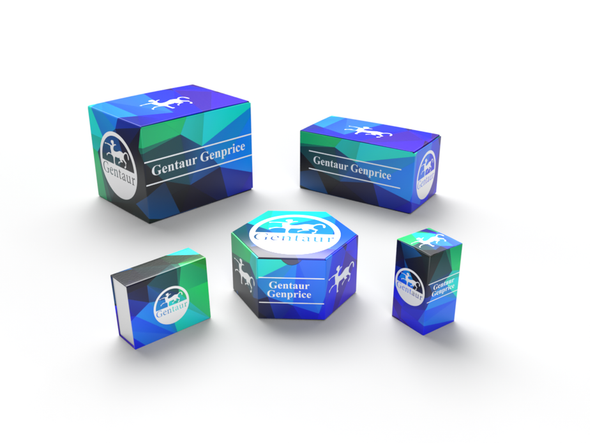Description
Rkhd2 Antibody | 4857 | Gentaur UK, US & Europe Distribution
Host: Rabbit
Reactivity: Human, Mouse, Rat
Homology: N/A
Immunogen: Rkhd2 antibody was raised against a 15 amino acid synthetic peptide from near the carboxy terminus of human RKHD2.
The immunogen is located within amino acids 540 - 590 of Rkhd2.
Research Area: Apoptosis
Tested Application: E, WB
Application: Rkhd2 antibody can be used for detection of Rkhd2 by Western blot at 0.5 - 1 μg/mL.
Antibody validated: Western Blot in rat samples. All other applications and species not yet tested.
Specificiy: N/A
Positive Control 1: Cat. No. 1461 - Rat Heart Tissue Lysate
Positive Control 2: N/A
Positive Control 3: N/A
Positive Control 4: N/A
Positive Control 5: N/A
Positive Control 6: N/A
Molecular Weight: N/A
Validation: N/A
Isoform: N/A
Purification: Rkhd2 Antibody is affinity chromatography purified via peptide column.
Clonality: Polyclonal
Clone: N/A
Isotype: IgG
Conjugate: Unconjugated
Physical State: Liquid
Buffer: Rkhd2 Antibody is supplied in PBS containing 0.02% sodium azide.
Concentration: 1 mg/mL
Storage Condition: Rkhd2 antibody can be stored at 4˚C for three months and -20˚C, stable for up to one year. As with all antibodies care should be taken to avoid repeated freeze thaw cycles. Antibodies should not be exposed to prolonged high temperatures.
Alternate Name: Rkhd2 Antibody: RKHD2, BM-013, MEX-3C, RNF194, RKHD2, RNA-binding E3 ubiquitin-protein ligase MEX3C, RING finger and KH domain-containing protein 2
User Note: Optimal dilutions for each application to be determined by the researcher.
BACKGROUND: Rkhd2 Antibody: Rkhd2, also known as MEX3C is a member of a novel family of four homologous human MEX3 proteins each containing two heterogeneous nuclear ribonucleoprotein K homology (KH) domains and one carboxy-terminal RING finger module. MEX3 proteins, including Rkhd2, are phosphoproteins that bind RNA through their KH domains and shuttle between the nucleus and the cytoplasm via the CRM1 export pathway. These proteins are a novel family of evolutionarily conserved RNA-binding proteins, differentially recruited to P bodies and potentially involved in post-transcriptional regulatory mechanisms. It has been suggested that genetic variations in Rkhd2 may be associated with susceptibility to essential hypertension type 8. Rkhd3 and Rkhd4, but not Rkhd2, co-localize with both the hDcp1a decapping factor and Argonaute (Ago) proteins in processing bodies (P bodies) , recently characterized as centers of mRNA turnover.






